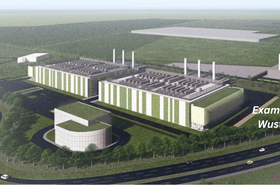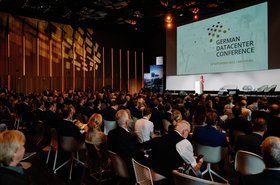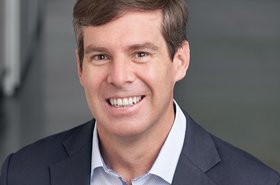Germany is the largest country in the European Union by population and has the highest GDP. It’s also got a thriving tech sector, closely linked to the financial hub in Frankfurt, which is one of the top data center hubs in Europe.
Frankfurt, London, Amsterdam, Paris, and Dublin make up the FLAP-D set of data center hubs, with Frankfurt currently coming second to London. But all these zones face increased pressure due to space and power considerations.
More importantly, the growth of the sector has brought it to the attention of the government - and brought regulations down on its head.
Frankfurt for the win
The annual conference of the German Datacenter Association (GDA) in September heard a lot about the fast growth of the sector including speakers who suggested that Frankfurt might be about to nudge London out of its leading position in Europe.
CBRE’s Michael Dada presented figures that suggested that Frankfurt will push through the 1GW barrier in 2024, describing that as a “breakthrough moment.” But he thought London would stay ahead, predicting that the UK’s capital would reach 1.2GW at that same point. CBRE has tracked London’s lead in data centers for a long while.
But some dispute that. Adam Tamburini, chief hyperscale officer at Stack Infrastructure, said: “[CBRE’s figures] say London is the biggest market - but I never feel that out in the industry,” he told the GDA conference (which was of course in Frankfurt). “When I look at the client demand, Frankfurt is always the city I'm asked about.”
Of course, Tamburini might be biased. His company is building an 80MW project for hyperscalers in a repurposed Coca-Cola factory in Frankfurt, and has not yet attacked any of the other FLAP-D sites.
But others echoed his thoughts, and suggested that real estate analysts and brokers like CBRE might be underestimating the huge volume of capacity that is being quietly bought by hyperscalers.
“From my perspective, London is not bigger than Frankfurt. In fact, Frankfurt is much larger,” said Rhea Williams, formerly in charge of European site selection for Oracle, and now building hyperscale facilities in the US with a new startup called E3 Platforms. She was speaking at DCD’s Connect event in London the following month, in a session about hyperscaler site selection in Europe.
Whether or not Frankfurt is poised to overtake London yet, there are plenty of people saying that it is on a faster growth curve, and will inevitably overtake it in the fullness of time.
Berlin - a two-hub nation?
Beyond the role of Frankfurt, others in Germany are predicting that the country will score another first - becoming the first European nation with two true data center hubs, thanks to a surge in developments in and around Berlin - in particular including a 300MW site being developed by Virtus.
“Frankfurt would have been a natural choice. So why did we choose Berlin?” Christina Mertens, VP of business development at Virtus told the GDA conference. Virtus is a big UK player, and aims to grow more of a presence in Europe.
It seems the company saw more of an opportunity to be a big player in a hub that is newly emerging, and possibly growing faster because capacity in Frankfurt was becoming harder to find.
“Berlin is the second cloud region that is emerging - and Germany is the only European data center market that is actually having two mega-regions,” Mertens said.
In the planning process, Virtus noted that Frankfurt was projected to double between 2018 and 2025 - but Berlin was predicted to have a compound growth rate of 30 percent per year: “That caught our interest.”
Until 2019, Berlin only had a few megawatts of capacity, but the plans have expanded since then, Mertens said: “Today we have roughly 100MW that is being planned, but our project is not included in that statistic.”
Some people have viewed Berlin as merely “overspill” from Frankfurt, but Mertens thinks there’s more to it. She is planning to have 200MW of her site online in 2026.
“Berlin is a market in itself, and what makes it so interesting is there is a lot of foreign investment going on in Berlin,” she said. “Look at the Tesla Gigafactory, and all the major hyperscalers have announced a presence in Berlin in the last couple of years.”
Google launched a cloud region there this summer, and Microsoft is also serving its Azure Germany North Europe region from Berlin.
The German government has said that data centers are “the lifeline of the digitized world,” Mertens pointed out. The local Berlin government, meanwhile, “understands the importance of data centers in that region,” and it understands that it must make the space they need available in the city.
Many businesses located in Berlin are a logistics gateway to Eastern Europe, which needs digital support, said Mertens. Beyond that, it is also “a hotspot for AI and machine learning development,” and therefore a logical place for more capacity: “There’s a very vibrant tech scene, with numerous startups and research institutes in the area. It has all the potential to become one of the central hubs for AI.”
Along with this, there is Potsdam University and the Hasso Plattner Institute on the outskirts of Berlin, and software giant SAP has a research center in the area - all of which boost the availability of technical staff in Berlin.
Despite this, some have poured cold water on her optimism over further major developments in Berlin, saying that the infrastructure isn’t sufficiently developed, creating a situation where more large projects would be politically unacceptable.
“The German government wanted to make Berlin a major IT hub,” one hyperscaler told us in private, ”but it doesn’t have the ecosystem. Berlin will be successful, but I don’t think it can be as big as Frankfurt. I don’t think the government will allow it to be.”
Berlin has a much larger population than Frankfurt, and the supply and distribution of electricity is limited. That Gigafactory is among the things causing demand on the infrastructure of the German capital, and more data centers in the Berlin metropolitan area could start to squeeze the availability of power for residential projects.
Data center developments in a major population center can be a political hot potato, as the west of London found in 2022, when data centers were reported to have swallowed up available connections effectively preventing large housing developments.
The Brandenburg state
Even if the central government has problems following through with support for data centers, Mertens thinks support is strong at the local government level, and points out that the Virtus facility’s location is actually Wustermark, 20 miles to the west of Berlin, within the Brandenberg state.
The Brandenburg state has a dedicated team looking after data centers, she said “and that shows they really see the potential for investment in the area.”
In Berlin and Brandenberg, land and power may be difficult to get hold of, but Mertens said: “It is difficult to find the right plot in the city of Berlin, but there are a lot of brownfield sites that need redevelopment, that are more than happy for anyone who wants to come and invest in that area and make it buildable and social.”
Mertens said there’s good connectivity across Brandenburg, and the land is flat. “It’s much more difficult to build a data center in Munich from a landscape point of view, compared to the very flat north of Germany.”
Across Brandenburg, there is also some 7.2GW of wind turbine power, and Mertens said: “The surprising thing is that not all this power is being used because of the difficulty of transmitting it across Germany.
Wooing the mayors
German local government officials are keen to have data centers if Mertens is correct - and a panel of mayors and legislators at the GDA conference seemed to agree.
“We were talking to local municipalities, and they were really, really excited at the benefit that data centers bring to the community,” said Mertens. “It’s not just the monetary perspective, or an investment perspective, but also developing talents, bringing more infrastructure, and bringing more entities into the market.”
Erika Schulte of the Hanau Business Development Agency said data centers would “make our business location more resilient,” and help reuse land and buildings in the city of Hanau, Hesse, that could not be used economically any other way.
“Municipalities need to pay money to keep up the infrastructure, the public swimming pools, the sporting places, etc,” said Klaus Schindling, Burgermeister of the town of Hattersheim, a long-term supporter of data centers. “You can only sell a plot of land once every 50 to 100 years - and data centers offer advantages for the city. They are not noisy, and they don't have lorries that use the streets of the municipality 24 hours a day, seven days a week.”
Data centers pay taxes, and give revenue to the municipality, he said.
Encroaching regulations
Not everyone is so positive about the growth of data centers. Germany has not had a large-scale public movement against data centers, like the ones in Ireland or the Netherlands, but the authorities in Frankfurt decided to regulate data center developments in 2021.
The city warned that there was limited land available, that data centers’ power demands might derail the city’s decarbonization plans, and suggested that waste heat should be reused.
A year later, Frankfurt came up with a zoning plan and promised to bring in requirements to reuse waste heat - once it has built a city-wide district heating system to make use of it.
Since then, government activity across the country - and across Europe - has increased. Europe has passed an Energy Efficiency Directive, which is part of the bloc’s move to decarbonize the continent.
The Directive explicitly includes data centers alongside other sectors and will require them to report on energy usage and efficiency, before eventually requiring efficiency measures that have yet to be defined.
All member states will have to implement the Directive in their national laws, and Germany is well ahead of the pack. The day before the finalized version of the EED was published in September 2023, the German federal government passed a nationwide Energy Efficiency Act, which is in part an enactment of the EED.
The German “Energieeffizienzgesetz” Act imposes restrictions on data centers, alongside all other sectors of industry. And, throughout its passage, the industry argued about the stringency of those restrictions.
The GDA, in particular, fiercely opposed some early demands in the act. Anna Klaft, head of the GDA described it as effectively a “data center prevention act,” saying its proposed demand for a PUE efficiency figure of 1.2, and its steep suggestions for heat reuse, were not feasible.
A 2022 draft of the bill would have applied to all data centers over 100kW, and required new facilities built from 2025 to reuse 30 percent of their heat. The GDA pointed out that data centers could only reuse heat if they were built near district heating systems.
There are very few such systems, and they are not located near fiber hubs which data centers need.
The eventual Act was presented to the conference by Benjamin Brake, who is head of the government’s Digital and Data Policy department at the Federal Ministry of Digital Affairs and Transport (BMDV), and took part in the negotiations that finalized it.
Brake is effectively part of the data center industry. Before taking his role in the civil service, he was head of IBM’s Berlin office, and he shared the final Act with the GDA conference, showing how requirements had been relaxed.
Efficiency Act - a compromise
The eventual Act only applies to data centers over 200kW, and the heat reuse requirements have been put off until 2028, by which time it is hoped there will be more district heating systems around, especially the “4.0” version of district heating, which is efficient enough to make use of the low-grade heat offered by data centers.
Data centers will also only be expected to reuse 20 percent of their heat - and there will be other clauses to exempt certain facilities.
Brake assured the conference that regulations were unavoidable, and sold the Act as a practical deal: “No industry can ignore the goals of the digital strategy, and the agreements of coalition [government] partners cannot be questioned, but we have to find a balance of what is reasonable.”
He agreed that data center sites cannot be chosen just on the basis of access to a district heating system: “The use of waste heat as the sole criteria for choosing a location is problematic, especially when there are no requirements and obligation for waste heat users.”
In practice, data centers will be required to offer their heat, which could simply mean they are built ready to share, but have no obligation to actually sign a deal to share their heat.
The GDA still doesn’t like the Act’s imposition of a PUE of 1.2 for all new data centers, although this doesn’t come into force till 2026. As Klaft told DCD, this is a problem for colocation providers because PUE requires a facility to be full and for racks to be operated efficiently, both of which are controlled by colo customers, and not by providers.
The changes in the Act came about because of strong lobbying by the data center sector, which argued that environmental measures should be balanced against the needs of the industry to remain competitive with those in other countries. If operators were required to make expensive changes to their operations, the government was told, Germany might lose data center business to other European states.
Sources involved in creating the Act told DCD that the process of creating the eventual Act was even more complicated than the public documents revealed. We understand that early proposals made no specific requirements to share a percentage of heat, but only required data center operators to publish information about the costs involved in producing the heat.
This proposal would have formed a useful basis for commercial contracts between data centers and the heating industry, something regarded as essential for heat sharing on a solid business footing. It was rejected by the industry, DCD was told, because it would have required data centers to share information that they regarded as commercially sensitive.
German data center operators are still fighting a rearguard action against the measures, and no one seemed enthused by them.
Stack is a possible exception, with Adam Temburini describing the heat reuse requirements as “an opportunity.” Many international providers, Stack included, already have facilities in the Nordic region that are connected to district heating systems.
Leading the way
Germany is a nation where data centers have developed to the extent that they impinge on daily life, sometimes offering useful income, jobs, and services, at other times seen as a consumer of land and power, as well as water.
The industry has ambitions to build much more capacity within Germany, but it is clear that this can only happen with the agreement of people, along with federal and local government.
“Regulation is going to be a big issue because we are growing so quickly,” said CBRE’s Dada. “Politicians have become aware of the opportunities, but also the threats with data centers, so we need to face new regulations.”
One response to the Act has been an Open Day. On September 29, colocation facilities in Germany opened their doors to the public, hoping to establish better relations with the societies where they are located.
Brake and Klaft agreed that the Act has begun a process of negotiation over data centers’ role in German society. But both seemed to feel that the dialog still has some way to go.
Data center people in Europe and around the world should keep a close eye on future developments. If a social contract is established between data centers and society, it is likely to happen first in Germany.










